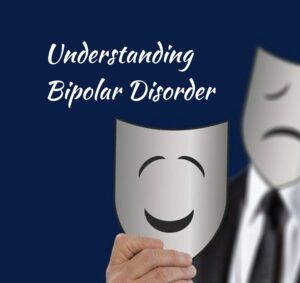Bipolar disorder is a complex mental health condition that affects millions of individuals worldwide. While it poses unique challenges, there is hope for those diagnosed with bipolar disorder. Fortunately, bipolar disorder therapy offers hope and effective strategies for managing this challenging condition. In this comprehensive guide, we’ll explore various therapeutic approaches, their benefits, and the essential role they play in helping individuals with bipolar disorder lead fulfilling lives.
Contents
Understanding Bipolar Disorder

Bipolar disorder, formerly known as manic depression, is a mood disorder characterized by extreme fluctuations in mood and energy levels. Individuals with bipolar disorder experience two distinct phases:
- Manic Episodes: During manic episodes, individuals may feel euphoric, have increased energy, and engage in impulsive behavior.
- Depressive Episodes: Depressive episodes involve intense sadness, low energy, and a loss of interest in activities.
There are several types of bipolar disorder, including:
- Bipolar I Disorder: Characterized by manic episodes lasting at least seven days or requiring hospitalization.
- Bipolar II Disorder: Involves depressive and hypomanic episodes (less severe mania).
- Cyclothymic Disorder: A milder form with frequent mood swings.
The Importance of Therapy in Bipolar Disorder Treatment
Therapy plays a crucial role in the treatment of bipolar disorder. Effective treatment typically involves a combination of medication and psychotherapy (talk therapy). Here are some key reasons why therapy is important in the management of bipolar disorder:
- Mood Stabilization: Therapy can help individuals with bipolar disorder learn strategies to stabilize their moods and manage mood swings. Cognitive-behavioral therapy (CBT) and dialectical behavior therapy (DBT) help individuals identify triggers and develop coping skills to prevent or reduce the severity of manic or depressive episodes.
- Medication Compliance: Many individuals with bipolar disorder are prescribed mood-stabilizing medications. Therapy can support medication compliance by providing education about the importance of medications and helping individuals understand and manage potential side effects.
- Early Intervention: Therapy can help identify early warning signs of mood episodes. When individuals are equipped with the knowledge and skills to recognize these signs, they can take proactive steps to prevent full-blown manic or depressive episodes or seek timely medical intervention.
- Improved Relationships: Bipolar disorder can strain relationships with family members, friends, and partners. Therapy can provide a safe space for individuals to work on interpersonal skills, communication, and conflict resolution, which can help improve and maintain healthier relationships.
- Coping Strategies: Bipolar disorder can be challenging to manage, and individuals may struggle with feelings of hopelessness and frustration. Therapy can teach effective coping strategies to deal with the emotional and practical challenges that arise due to the condition.
- Relapse Prevention: Regular therapy sessions can serve as a support system and help individuals develop a relapse prevention plan. This plan can include strategies for maintaining stability, recognizing triggers, and seeking help when needed.
Types of Bipolar Disorder Therapy

There are several types of therapy (psychotherapy or talk therapy) that can be beneficial for individuals with bipolar disorder. Here are some of the main types of therapy used in the treatment of bipolar disorder:
- Cognitive-Behavioral Therapy (CBT): CBT is a widely used therapy for bipolar disorder. It focuses on identifying and changing negative thought patterns and behaviors. In CBT for bipolar disorder, individuals learn to recognize early warning signs of mood episodes, challenge irrational beliefs, and develop coping strategies to manage mood swings.
- Dialectical Behavior Therapy (DBT): DBT is a type of therapy originally developed for borderline personality disorder but was later used in bipolar disorder. It emphasizes mindfulness, emotional regulation, distress tolerance, and interpersonal effectiveness. DBT can help individuals with bipolar disorder manage intense emotions and improve their relationships.
- Interpersonal and Social Rhythm Therapy (IPSRT): IPSRT is specifically designed for bipolar disorder. It focuses on stabilizing daily routines and sleep patterns, which can help regulate mood. IPSRT also addresses interpersonal issues and the role of social support in managing bipolar symptoms.
- Family-Focused Therapy (FFT): Bipolar disorder often affects not only the individual with the diagnosis but also their family. FFT involves the family in the treatment process, helping them understand the disorder and develop strategies for improving communication and support within the family unit.
- Psychoeducation: While not a therapy in the traditional sense, psychoeducation is an essential component of bipolar disorder treatment. It involves providing individuals and their families with information about the disorder, its symptoms, treatment options, and coping strategies. Psychoeducation helps individuals become more informed and engaged in their treatment.
- Group Therapy: Group therapy sessions bring together individuals with bipolar disorder to share their experiences, offer support, and learn from one another. Group therapy can be particularly helpful in reducing feelings of isolation and providing a sense of community.
- Mindfulness-Based Cognitive Therapy (MBCT): MBCT combines elements of CBT with mindfulness practices. It helps individuals become more aware of their thoughts and feelings without judgment and develop skills for managing distressing emotions.
- Art or Creative Therapies: Some individuals with bipolar disorder find expressive therapies like art therapy or music therapy helpful in managing their emotions and expressing themselves in non-verbal ways.
- Supportive Therapy: This type of therapy focuses on providing emotional support and a safe space for individuals to discuss their thoughts and feelings. It may not have a specific structure or technique but can be valuable in building trust and rapport with a therapist.
Finding the Right Therapist
Finding the right therapist is a crucial step in getting the help and support you need for managing mental health concerns, including bipolar disorder. Here are some steps to help you find a therapist who is a good fit for you:
- Identify Your Needs: Before you start searching for a therapist, take some time to clarify what you need in terms of therapy. Consider your specific concerns related to bipolar disorder, your treatment goals, and any preferences you have regarding the therapist’s approach, such as therapy type (e.g., CBT, DBT), gender, or cultural sensitivity.
- Get Referrals: Start by asking for recommendations from trusted sources, such as your primary care physician, psychiatrist, friends, or family members who may have experience with therapy. You can also use online therapist directories and search engines to find therapists in your area.
- Check Credentials: Ensure that the therapist you’re considering is licensed and qualified to provide therapy services. In the Australia, you can verify a therapist’s credentials through your state’s licensing board. Look for therapists with experience in treating bipolar disorder or mood disorders.
- Research Therapists: Once you have a list of potential therapists, research their backgrounds, specialties, and treatment approaches. Read their profiles on therapy directories, visit their websites (if available), and look for reviews or testimonials from previous clients.
Tips for Supporting a Loved One with Bipolar Disorder
Supporting a loved one with bipolar disorder can be challenging, but your support and understanding can make a significant difference in their well-being and recovery. Here are some tips for providing effective support:
- Educate Yourself: Learn about bipolar disorder. Understand its symptoms, treatment options, and potential triggers. Knowledge will help you better understand what your loved one is going through.
- Encourage Treatment: Encourage your loved one to seek professional help and stick to their treatment plan. Medication and therapy are often crucial components of managing bipolar disorder.
- Attend Appointments: If your loved one is open to it, offer to accompany them to therapy sessions or medical appointments. Your presence can provide emotional support and help ensure they follow through with treatment.
- Help Monitor Medication: Some individuals with bipolar disorder may struggle with medication adherence. Offer to help them keep track of their medication schedule and watch for any side effects or changes in mood.
- Be Patient: Understand that bipolar disorder involves mood swings, and your loved one may have periods of high energy (mania) or low energy (depression). Be patient and non-judgmental during these times.
- Listen Actively: Be a good listener. Let your loved one talk about their feelings and experiences. Avoid offering unsolicited advice or trying to “fix” their problems. Sometimes, they just need someone to listen and empathize.
- Recognize Triggers: Work together to identify potential triggers for mood episodes, such as stress, sleep disturbances, or certain life events. Help your loved one develop strategies to manage or avoid these triggers.
Challenges and Misconceptions in Bipolar Disorder Therapy

Therapy for bipolar disorder can be highly effective, but it also comes with its own set of challenges and misconceptions. Here are some of the common challenges and misconceptions associated with therapy for bipolar disorder:
Challenges:
- Mood Variability: The unpredictable nature of bipolar disorder can make it challenging to maintain consistency in therapy. A person with bipolar disorder may feel motivated to attend therapy during a stable period but may struggle to engage during manic or depressive episodes.
- Medication Compliance: Some individuals with bipolar disorder may be hesitant to take medication, and this can pose a challenge to the effectiveness of therapy. Therapy often works best when combined with medication management, and non-adherence can hinder progress.
- Lack of Insight: During manic or hypomanic episodes, individuals with bipolar disorder may lack insight into their condition and resist treatment recommendations. This can be challenging for therapists trying to engage clients in therapy during these periods.
- Stigma: Stigma surrounding mental health conditions, including bipolar disorder, can discourage some individuals from seeking therapy. They may fear being judged or labeled as “crazy.”
Misconceptions:
- Therapy Alone Can Cure Bipolar Disorder: While therapy is a valuable component of bipolar disorder treatment, it is not a cure on its own. Furthermore, medication management is often necessary to stabilize mood swings, and therapy provides strategies for coping and managing symptoms.
- Therapists Can Control Mood Episodes: Some individuals may have unrealistic expectations that therapists can prevent or control their mood episodes. While therapy can help individuals recognize and manage symptoms, therapists cannot directly control or prevent mood swings.
- Therapy Is Only for Severe Episodes: Therapy is not only for individuals experiencing severe mood episodes. It can be beneficial at all stages of bipolar disorder, including during periods of stability, to build coping skills, prevent relapses, and work on long-term wellness.
Conclusion
Bipolar disorder therapy is multifaceted, encompassing medication management, psychotherapy, and lifestyle adjustments. With the right support and strategies, individuals with bipolar disorder can lead fulfilling lives and manage their condition effectively.
This article aims to provide valuable information and support to those affected by bipolar disorder, helping them find balance and hope on their journey towards improved mental health. If you are looking for an affordable Online Therapy TherapyMantra can help: Book a trial Online therapy session.


